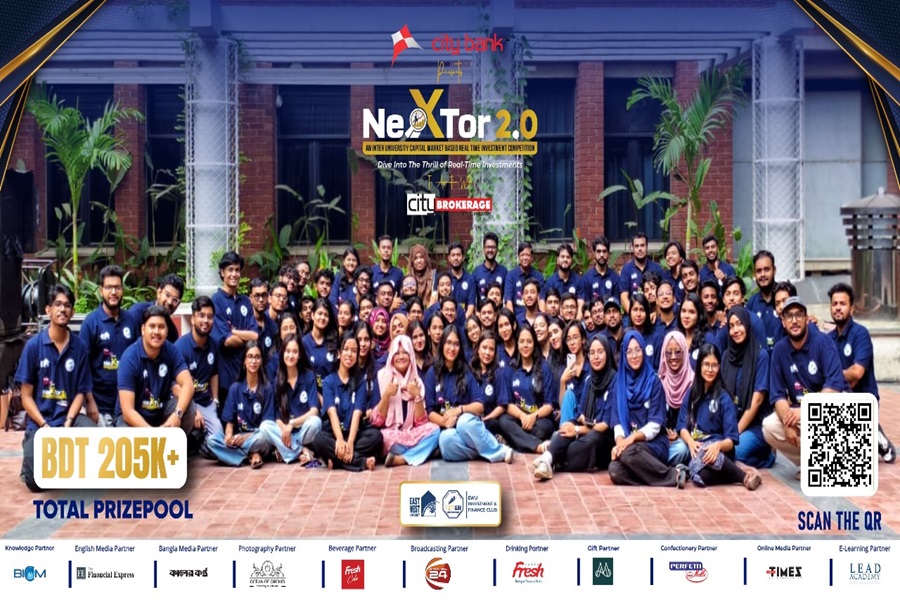
Published :
Updated :

Financial literacy remains one of Bangladesh's quiet deficits. Whilst the country produces thousands of business graduates annually, a few understand portfolio construction or market mechanics before entering the workforce. Most learn through expensive mistakes or avoid equity markets entirely, perpetuating cycles of mistrust that have haunted the investors.
The East West University Investment & Finance Club is attempting to change that pattern. On October 22, the organisation announced NeXTor 2.0, an inter-university competition that hands undergraduate students real trading capital and requires them to navigate actual market conditions. This isn't simulation. Participants receive Tk 15,000 and beneficiary owner accounts to construct portfolios that will rise or fall with genuine market movements.
Learning through consequence: The competition structure acknowledges that investment knowledge requires more than theory. Four workshops will run from October 30, covering basic investment principles, portfolio construction techniques, and trading mechanics. Between these sessions, participants face competitive rounds testing their grasp of concepts just introduced.
The opening round demands case analysis, forcing teams to evaluate companies and market conditions before they've mastered the vocabulary. Subsequent workshops then address portfolio construction in detail. Only after this foundation gets established do participants receive their trading capital and BO accounts to build competitive portfolios.
Traditional finance education separates theory from practice by semesters or years. Students memorise capital asset pricing models without understanding bid-ask spreads. They analyse historical returns without experiencing the psychology of watching their own capital fluctuate. NeXTor 2.0 compresses this timeline drastically, creating consequences for decisions made days after learning underlying concepts.
The prize structure: The competition offers a total prize pool of Tk 2,05,000, with the champion team receiving Tk 50,000, first runner-up earning Tk 30,000, and second runner-up taking Tk 20,000. Beyond cash prizes, finalists receive certificates, crests, BO accounts with trading capital, and access to skill development courses and internship opportunities.
These rewards extend past immediate gratification. Participants advancing to round three gain exposure to professional networks and practical experience that typically remains inaccessible until after graduation. For undergraduates, particularly those outside elite institutions, this represents rare access to market infrastructure and mentorship.
Why this matters now: Bangladesh faces a trust crisis in its equity markets. Regulatory enforcement remains inconsistent. Manipulation concerns persist. Retail investors continue losing whilst insiders profit. This environment creates self-perpetuating problems: distrust keeps capital away, shallow markets enable manipulation, manipulation reinforces distrust.
Breaking this cycle requires creating a generation of informed investors who understand market mechanics well enough to distinguish between systematic risk and systemic dysfunction. When thousands of young professionals enter the workforce having built actual portfolios, analysed real companies, and experienced market volatility firsthand, the quality of market participation improves.
City Bank sponsors the event as title partner, with City Brokerage Limited serving as associate. BIOM acts as the knowledge partner. The Financial Express is a media partner of the event.
The broader implication: Financial literacy education in Bangladesh tends towards two extremes: abstract theory divorced from practice, or informal learning through costly trial and error. University curricula teach efficient market hypothesis without addressing how Bangladeshi markets actually function. Meanwhile, young professionals enter markets unprepared, make predictable mistakes, and retreat to fixed deposits and real estate.
NeXTor 2.0 occupies middle ground. Participants learn theory through workshops but immediately apply concepts with real capital at stake. They experience the psychological dimensions of investment that textbooks cannot convey: the temptation to chase momentum, the difficulty of admitting mistakes, the discipline required to maintain strategy when portfolios decline.
The grand finale will take place on December 14, 2025, and will be followed immediately by closing and prize-giving ceremonies. By that date, participants will have spent six weeks constructing portfolios, monitoring positions, and responding to market movements. Some will have earned returns. Others will have lost capital. All will have learned more about investment reality than most business graduates acquire in four-year degrees.
Whether this model scales beyond one competition remains uncertain. But the principle it demonstrates seems sound: financial literacy requires consequence, and consequence requires capital. Give students real money, real markets, and real stakes. Then watch what they learn.
The writer is the head of Research and Development at East West University Investment and Finance Club.
bushra122002@gmail.com


 For all latest news, follow The Financial Express Google News channel.
For all latest news, follow The Financial Express Google News channel.